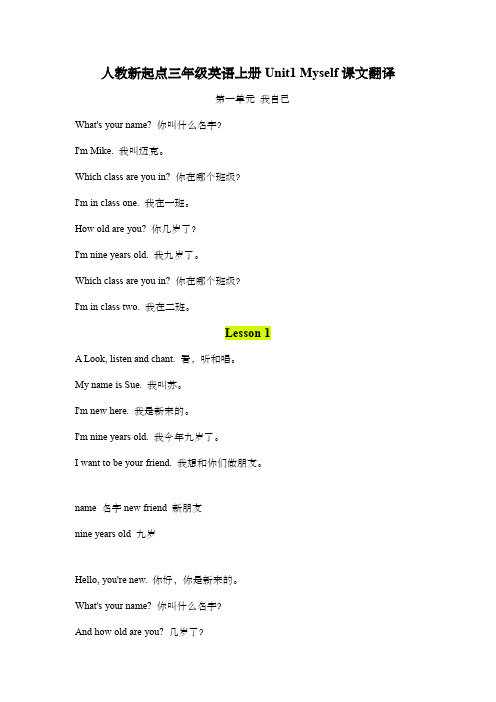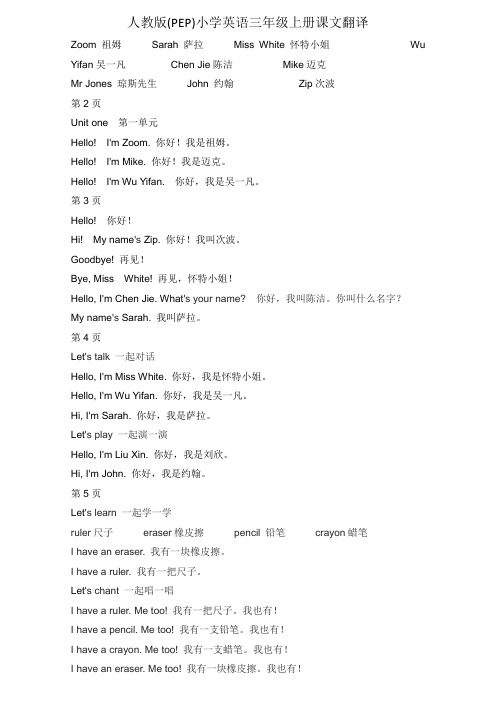第一单元英语课文翻译及标注
人教版六年级上册英语教材课文翻译Unit1~3

人教版六年级上册英语教材课文翻译Unit1~3人教版六年级上册英语教材课文翻译U n i t1~3R e c y c l e 1 Unit1 How can I get thereHey,Robin. Where is the science museum嘿,罗宾。
科学博物馆在哪儿?It's near the library.它在图书馆附近。
I see. How can I get there 我知道了。
我怎么到那儿?Turn right at the school. Then go straight.到学校右转。
然后直走。
OK. Let's go.好的。
让我们走吧。
Excuse me. Can you help me打扰一下,你能帮助我吗?Sure.当然。
How can I get to the science museum 我怎么到科学博物馆?It's over there.它在那边。
Thanks.谢谢。
Oh, where is Robin哦,罗宾在哪儿?P4 Let's tryWu Yifan and Robin are looking at some robots. Listen and tick.吴一凡和罗宾正在看一些机器人。
听一听并打钩。
1.Where are they 他们在哪儿?In the museum.在博物馆里。
In the bookstore 在书店里。
2.Is Grandpa there (外)祖父在那儿吗?Yes,he is.是的,他在。
No,he isn't.不,他不在。
P4 Let's talk部分翻译Wu Yifan:Robin,where is the museum shop I want to buy a postcard.吴一凡:罗宾,博物馆的商店在哪儿?我想要买一张明信片。
Robin:It's near the door.罗宾:在大门附近。
资料《Unit1课文原文与翻译(素材)译林版九年级英语下册》

译林版九年级下册英语课文及翻译UNIT 1英中对照版UNIT1Comic strip1. Wow,the Great Wall is amazing,isn’t it?哇!长城真壮观啊,不是吗?2. No,it isn’t.It’s tiring to climb the steps and my feet hurt.I’m taking a rest.不,才不是呢!爬这些台阶真累人,而且我的脚也磨疼了。
我要休息一下。
3. No,Eddie! There’s still a long way to go. We’d better keep moving不,埃迪!还有很长一段路要走。
我们最好继续前进。
4. I don’t want to go on,Hobo. Wake me up on your way back.我不想继续(走)了,霍波。
在你回来的途中叫醒我。
九下· p7Welcome to the unitKevin a British exchange student,is asking Millie for suggestions on his travel plan.Work in pairs and give your own ideas about it.Use the conversation below as a model.凯文一名英国交换生,正在向米莉征求有关他旅行计划的建议。
两人一组活动,就这件事给出你自己的观点。
用下面的对话作为范例。
Kevin:I’m planning to travel around China.Where shall I visit first,Millie? 凯文:我打算环游中国。
米莉,我首先应该参观哪里呢?Millie:Since you’re in Beijing now,why don’t you start from here?Tian’anmen Square,the Palace Museum and the Great Wall are wonderful places to go.米莉:由于你现在就在北京,为什么不从这里开始呢?天安门广场、故宫博物院和长城都是很好的去处。
大学英语自学教程上册1-10课文及翻译

第一单元课文Aon th e oth er ha ndH ow to Be a Succ essfu l Lan guage Lear ner?怎样成为一名成功的语言学习者"Le arnin g a l angua ge is easy.Even a ch ild c an do it!"“学好一种语言很容易。
连孩子都做得到!”M ost a dults whoare l earni ng asecon d lan guage大多数学习第二语言的成年人wo uld d isagr ee wi th th is st ateme nt.不会同意这一说法。
Forthem,learn ing a lang uageis averydiffi culttask.对于他们来说,学习语言是一项很困难的任务。
The y nee d hun dreds of h oursof st udy a nd pr actic e,他们需要数百小时的学习和练习,andeventhiswillnot g uaran tee s ucces s就是这样也不能保证f or ev ery a dultlangu age l earne r.每一位成年语言学习者都能成功。
Lang uagelearn ing i s dif feren t fro m oth er ki nds o f lea rning. 语言学习不同于基它种类的学习。
somepeopl e who areveryintel ligen t有些很聪明并在自己领域andsucce ssful in t heier fiel ds fi nd it diff icult很有成就的人却发现to succ eed i n lan guage lear ing.学好语言很难。
人教新起点三年级英语上册Unit1 Myself课文翻译

人教新起点三年级英语上册Unit1 Myself课文翻译第一单元我自己What's your name? 你叫什么名字?I'm Mike. 我叫迈克。
Which class are you in? 你在哪个班级?I'm in class one. 我在一班。
How old are you? 你几岁了?I'm nine years old. 我九岁了。
Which class are you in? 你在哪个班级?I'm in class two. 我在二班。
Lesson 1A Look, listen and chant. 看,听和唱。
My name is Sue. 我叫苏。
I'm new here. 我是新来的。
I'm nine years old. 我今年九岁了。
I want to be your friend. 我想和你们做朋友。
name 名字new friend 新朋友nine years old 九岁Hello, you're new. 你好,你是新来的。
What's your name? 你叫什么名字?And how old are you? 几岁了?Hello. I'm new. 你好。
我是新来的。
My name's Sue. 我叫苏。
And I'm 9 years old. 九岁了。
B Let's role-play. 角色扮演。
Hello.My name is Sue. 你好。
我名叫苏。
I'm new here. 我是新来的。
I'm nine years old. 我九岁了。
I want to be your friend. 我想和你做朋友。
Hello. My name is Jack. 你好。
我名叫杰克。
I'm eight years old. 我八岁了。
【2024秋季】最新人教版七年级上册英语第一单元Unit1《You and me 》课文翻译

【2024秋季】最新人教版七年级上册英语第一单元Unit1《You and me 》课文翻译Unit 1单元1You and Me你和我Big Question. How do we make new friends?大问题。
我们如何交新朋友?In this unit, you will.在本单元中,你将:1. Introduce yourself and others.介绍自己和他人。
2. Talk about personal information with the simple present tense (be). 用一般现在时谈论个人信息(be)。
3. Make your own personal profile.制作你自己的个人简介。
4. Explore how to make new friends.探讨如何交新朋友。
Look and share.看和分享。
1. Who are the people in the photo?照片里的人是谁?2. Where are they?他们在哪里?3. How do you think they feel?你觉得他们感觉如何?Section A. How do we get to know each other?A节。
我们如何彼此了解?1a. Tick the expressions you know.1a. 勾选你知道的表达方式。
Hello.你好。
Nice to meet you.很高兴见到你。
How do you spell your name?你的名字怎么拼?Where are you from?你来自哪里?Good morning.早上好。
May I have your name?我可以知道你的名字吗?How old are you?你几岁了?What class are you in?你在哪个班?1b. Listen to two conversations and number the pictures in the order you hear them.1b. 听两段对话,并按听到的顺序给图片编号。
人教新起点版小学一年级上册英语课文翻译

人教新起点版小学英语一年级上册课文翻译Unit1 School第一单元学校I have a ruler.我有一把尺子。
I have a pencil.我有一支铅笔。
I have a book.我有一本书。
Lesson 1A Look, listen and chant.A 看,听和唱。
book书ruler尺子pencil铅笔schoolbag书包teacher老师Hello, pencil! Hello, ruler!Hello, schoolbag!Hello! Hello, book! Hello, teacher!Hello! Hello! Hello!(歌曲)B Listen and do.B听和做。
Stand up, Joy. Show me your pencil.Sit down, please.起立,乔伊。
出示你的铅笔。
请坐下。
C Listen and chant again.C听并再唱一遍。
Hello, pencil! Hello, ruler!Hello, schoolbag!Hello! Hello, book! Hello, teacher!Hello! Hello! Hello!Lesson 2A Look, listen and repeat.A看、听并跟读。
I have a ruler.我有一把尺子。
I have a pencil.我有一支铅笔。
B Let's playB让我们一起来玩I have a schoolbag.我有一个书包。
I have a book.我有一本书。
Lesson 3B Let's sing.B唱一唱。
I have a pencil. I have a book.I have a beautiful schoolbag, too.I have a ruler.I have a teacher.Hello! Hello to you!我有一个铅笔,我有一本书。
三年级上册英语PEP人教版第一单元《Hello》课文翻译和音标

三年级上册英语PEP人教版第一单元《Hello》课文翻译和音标Hello! I'm Zoom. 您好!我是祖姆。
[həˈləʊ;he-][aɪm][zuːm].Hello, I'm Mike. 你好,我是迈克。
[həˈləʊ;he-],[aɪm][maɪk].Hi, I'm Wu yifan. 你好,我是吴一凡。
[haɪ],[aɪm][wuː]yifan.Hi! My name's Zip. 你好!我的名字是次波。
[haɪ][maɪ]name's[zɪp].Goodbye! 再见![ˌɡʊdˈbaɪ]Bye, Miss White ! 再见,怀特小姐![baɪ],[mɪs][waɪt]Hello,I'm Chen Jie. 嗨,你好,我叫陈洁。
[həˈləʊ;he-],[aɪm]chenjie.What's your name? 你叫什么名字?[wɒts][jɔː;jʊə][neɪm]?My name's Sarah. 我叫莎拉。
[maɪ]name'ssarah.Let’s talkHello, I'm Miss White. 你好,我是怀特小姐。
[həˈləʊ;he-],[aɪm][mɪs][waɪt].Hello, I'm Wu yifan. 你好,我是吴一凡。
[həˈləʊ;he-],[aɪm][wuː]yifan.Hi, I'm Sarah. 你好!我是莎拉。
[haɪ],[aɪm]sarah.Hello, I'm Liu Xin. 你好!我是刘欣。
[həˈləʊ;he-],[aɪm]liuxin.Hi, I'm John. 嗨,我是约翰。
[haɪ],[aɪm][dʒɒn].L et’s chantI have a ruler. 我有一把尺子。
[aɪ][hæv][ə;eɪ][ˈruːlə].I have a ruler. Me too ! 我有一支尺子。
人教版(PEP)小学英语三年级上册课文翻译

人教版(PEP)小学英语三年级上册课文翻译Zoom 祖姆Sarah 萨拉Miss White怀特小姐Wu Yifan吴一凡Chen Jie陈洁Mike迈克Mr Jones 琼斯先生John 约翰Zip次波第2页Unit one 第一单元Hello! I'm Zoom. 你好!我是祖姆。
Hello! I'm Mike. 你好!我是迈克。
Hello! I'm Wu Yifan. 你好,我是吴一凡。
第3页Hello! 你好!Hi! My name's Zip. 你好!我叫次波。
Goodbye! 再见!Bye, Miss White! 再见,怀特小姐!Hello, I'm Chen Jie. What's your name? 你好,我叫陈洁。
你叫什么名字?My name's Sarah. 我叫萨拉。
第4页Let's talk 一起对话Hello, I'm Miss White. 你好,我是怀特小姐。
Hello, I'm Wu Yifan. 你好,我是吴一凡。
Hi, I'm Sarah. 你好,我是萨拉。
Let's play 一起演一演Hello, I'm Liu Xin. 你好,我是刘欣。
Hi, I'm John. 你好,我是约翰。
第5页Let's learn 一起学一学ruler尺子eraser橡皮擦pencil 铅笔crayon蜡笔I have an eraser. 我有一块橡皮擦。
I have a ruler. 我有一把尺子。
Let's chant 一起唱一唱I have a ruler. Me too! 我有一把尺子。
我也有!I have a pencil. Me too! 我有一支铅笔。
我也有!I have a crayon. Me too! 我有一支蜡笔。
我也有!I have an eraser. Me too! 我有一块橡皮擦。
- 1、下载文档前请自行甄别文档内容的完整性,平台不提供额外的编辑、内容补充、找答案等附加服务。
- 2、"仅部分预览"的文档,不可在线预览部分如存在完整性等问题,可反馈申请退款(可完整预览的文档不适用该条件!)。
- 3、如文档侵犯您的权益,请联系客服反馈,我们会尽快为您处理(人工客服工作时间:9:00-18:30)。
●Welcome back ,everyone(每个人)!
●欢迎回来,同学们
●T oday ,we’re going to talk about good ways to learn English.
●今天,我们打算讲有关好方法去学习英语●今天,我们打算将一些学习英语的好方法。
◆Be (am is are)going to do
◆=will do
●Ready?
●真的吗?
●Who has some advice(不可数名词)?
●谁有一些建议
●Good!
●棒!
●Let’s try to speak English as much as possible(可能)
●让我们尝试去讲英语尽可能多
●让我们尽可能多地去讲英语
●Try to do sth
●Why not write down our mistakes in our notebooks?
●为什么不写下我们的错误在我们的笔记本●Why not do sth
●That’s a good idea.
●那是一个好的主意
●And don’t forget to write down the correct answers next to ●和不要忘记去写下那个正确的答案在旁边●the mistakes
●错误
●和不要忘记写下那个正确的答案在旁边
●Forget to do sth(东西)
●What else?
●什么其他
●还有其他什么吗
●It is a good idea to spell and pronounce the new words ●这是一个好的主意去拼写和发音那个新的单词●everyday.
●每天
●这是一个好主意每天去拼读新的单词
●It‘s a good idea to do
●Thanks a lot .lingling
●感谢一些玲玲
●Thanks =thank you
●How about listening to the radio?
●怎么样听收音机
●How about doing sth
●Yes,that’s good for our pronouncation too.
●是的,那好处对我们的发音也
●是的,那对我们的发音也很有好处
●But there are so many new words
●但是那里有如此多新的单词
●You don’t need to understand every word.
●你不需要去理解每一个单词
●Need to do sth
●You just need to listen for key words and main ideas ●你仅仅需要去听对于关键单词和主要的意思●That’s the same for reading
●那一样对阅读
●那对于阅读来说是一样的
●For +n名词
●For +v动词ing
●English stories are so interesting
●英语故事是如此有趣
●I get to know a lot about the world through reading
●我获得去知道一些有关于世界通过阅读
●I think writing is also important.
●我认为写作是也重要的
●我认为写作也是很重要的
●Why don’t we try to find some English pen friends?
●为什么不我们尝试去找一些英语笔友
●Why don’t we do
●We can write to them
●我们可以写信给她们
●Excellent! I agree with you.
●棒极了我同意你。
